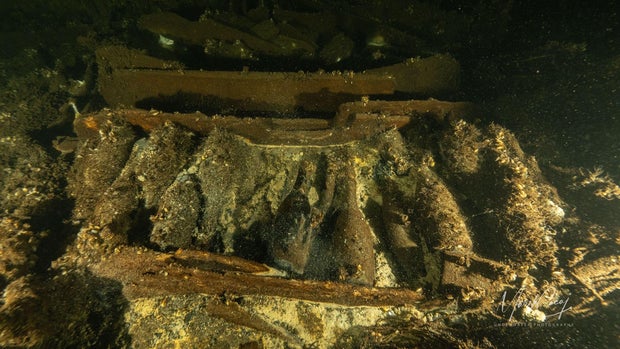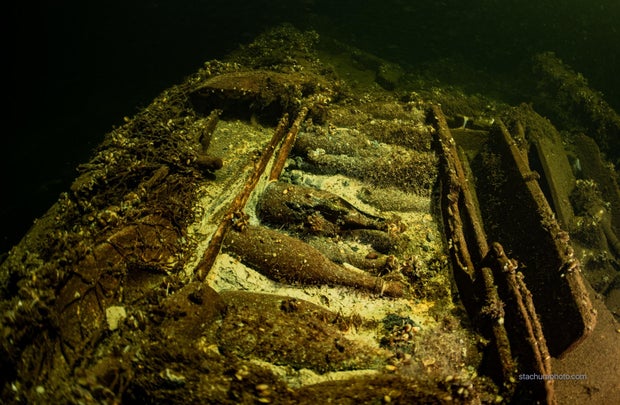A team of divers has discovered a massive haul of champagne and wine on a shipwreck on the floor of the Baltic Sea. On a recent dive trip off the coast of Sweden, the Polish diving group BaltiTech spotted what looked like an old fishing boat on their sonar, 20 or so nautical miles south of the Aland islands, between Sweden and Finland.
“At first, there were doubts whether there would be anyone willing to go down,” they said in a post on their website. But two of them decided to jump in and head down for a quick look.
Tomasz Stachura/BaltiTech
When they didn’t return for two hours, the rest of the team suspected “there was something very interesting on the bottom.”
Their hunch was right. The divers swam down to discover a 19th century sailing ship “in very good condition, loaded to the sides with champagne, wine, mineral water and porcelain.”
“I’ve been a diver for 40 years. From time to time, you see one or two bottles,” Tomasz Stachura, who leads the team, told CBS News’ partner network BBC News. “But I’ve never seen crates with bottles of alcohol and baskets of water like this.”
“We certainly saw more than 100 bottles of champagne and baskets of mineral water in clay bottles,” said the group.
The clay bottles helped the group establish the shipment was produced between 1850 and 1867.
Tomasz Stachura/BaltiTech
The water, in bottles made by the German company Selters, might suggest who the ship belonged to.
“In those days, mineral water was treated almost like medicine and only found its way to royal tables,” according to the diving group. “Its value was so precious that transports were escorted by the police. We came across about 100 sealed bottles.”
Stachura told the BBC that he believes the “treasure” could have been destined for Stockholm or St. Petersburg, on its way to Russia’s Tsar Nicholas I, who in 1852 reportedly lost a ship in the area.
Incredibly, this is not the oldest champagne ever found on a Baltic shipwreck.
In 2010, diving instructor Christian Ekstrom and his team discovered 30 or so bottles of bubbly on a sunken ship near the Aland Islands. Ekstrom said the bottles, found at a depth of 200 feet, were believed to be from the 1780s and likely were part of a cargo destined for Russia.
“We brought up the bottle to be able to establish how old the wreck was,” he told The Associated Press at the time. “We didn’t know it would be champagne. We thought it was wine or something.”
Ekstrom said the divers were overjoyed when they popped the cork on their boat after hauling the bubbly up from the depths.
“It tasted fantastic,” he said. “It was a very sweet champagne, with a tobacco taste and oak.”







